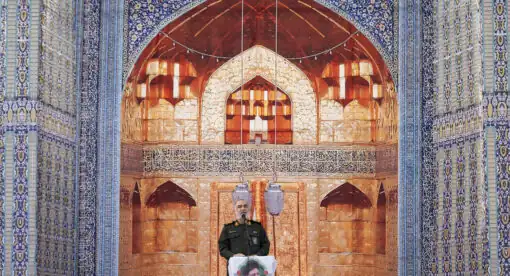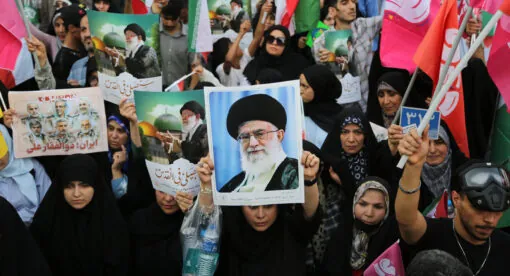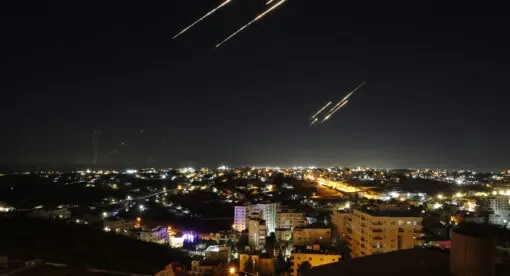In this episode of the Contours podcast, host Caroline Rose and Tammy Palacios, senior analyst of New Lines’ Priority Sustainable Counterterrorism portfolio, to discuss the history of the French involvement in the Sahel, the security implications of the French departure from the region, and how it affects U.S. security.
Caroline Rose:
Hello and welcome to this latest episode of Contours, a New Lines Institute podcast series. My name is Caroline Rose. I am the director of the Military Withdrawals Portfolio, a project that explores the spectrum of security, political and economic implications of full-scale or partial military withdrawal around the world.
In late December, the last contingent of about 1,500 French military forces deployed to Niger for a decade-long counter-terrorist mission departed from Niger following demands from army officers that seized power in the country this past summer. France also closed its diplomatic mission in Niger for an indefinite period. This withdrawal has raised questions about the status of France’s influence in West Africa, but few questions have been posed about what impact this withdrawal will have upon the local security landscape.
And so today I am very excited to have my colleague, Tammy Palacios, with me to talk about this French withdrawal from Niger, the history of this military mission, the expected implications of its withdrawal and potential policy pathways to mitigate risks.
Tammy is a senior analyst and a manager leading the Priority Sustainable Counterterrorism portfolio at the New Lines Institute for Strategy and Policy. She’s also a 2023-2024 research fellow with the Modern War Institute at West Point, and sits on the steering committee for the Harvard Humanitarian Atrocity Prevention Lab. Tammy previously served as the program head for the Non-State Actors program at the Institute where she worked in the field of violent and nonviolent state actors.
Tammy, thank you so much for joining me today to discuss this new development. I want to start off with the history of the French-led mission in Niger. Can you describe the imperatives behind this mission and its mandate and how they operated for just around a decade?
Tammy Palacios:
Of course. As you mentioned, Operation Barkhane started 2014 and was about 600 to 700 million euros a year and was kind of set between four countries, so Mali, Burkina Faso, Mauritania, and Chad, which were all former French colonies. And it was a range of aircraft and basing and intelligence. But on the ground was the likes of combat patrols along partner forces, for example, alongside Malian military forces and intelligence gathering and some local development activities. It was meant to be a more comprehensive counterterrorism approach in its strategy, but what ended up happening is on the ground that wasn’t always as well coordinated with all other international or regional or national efforts.
So while we had kind of a comprehensive strategy on the outset that was fairly well funded and had about 3,500 to 4,000 troops over the course, at least from French support, and then had other international force supplements. There was quite a bit of money and quite a bit of presence. So that was a good decade of Operation Barkhane. That was headquartered in Chad, but there was also basing with its partners in Niamey and Agadez and other parts of the Sahel.
So that’s something that was with those G5 Sahel countries that I mentioned, Burkina Faso, Chad, Mali, Mauritania, Niger and was supposed to be a support or supported a United Nations integrated strategy for the Sahel, which you’d see comments on at the security council for example, and other, for example, economic conferences and other more international collaboration efforts.
So on paper, a pretty solid strategy and certainly collaborative in nature. The result is that it did succeed in pushing back that Tuarag rebel revolution back in 2012. And that was the conflict that in 2014 when this operation started, those were the main actors in the AQIM and it was a different set of actors than we have today in form.
So when Operation Barkhane started, we had a different set or a different form of the actors that we see today in a rising terrorism threat in JNIM and in ISGS, which we can touch on in a moment here. But it was successful in encountering or at least pushing back in the beginning that the threat of a further insecurity from this Tuarag rebel uprising, and we had the fall of Gadhafi in Libya and AQIM in Algeria. So there was some initial success, but in terms of eradicating the threat completely or succeeding in the counterterrorism over the course of the 10 years of Operation Barkhane, that obviously was not as successful.
So it succeeded in pushing back what could have been a further conflict in the beginning, but in terms of at its withdrawal in 2024, certainly left with a heightened al-Qaeda ISIS threat in the Sahel.
Caroline Rose:
Absolutely. So it sounds like it was a very collaborative counter-terrorism mission, but something that had to evolve with a lot of these local security conditions. And certainly as we’ve all seen in the last few months, there was a military coup and then of course came demands for French forces to leave. However, there had been some signals from Macron and the French government about a more rotational, less permanent posture for French forces. Do you think France will undertake such a strategy? Will they try and find ways to get creative to posture their forces in the Sahel to continue this mission and adapt to some of these new security conditions? Do you think it’s possible in the region, since we’ve seen a sharp uptick of military juntas hostile to foreign military presence,
Tammy Palacios:
That is unlikely to happen in the short term. Let me, I guess take a step back to answer that. So when Wagner now rebranded or renamed as Africa Corps stepped into the Sahel, they prepped their on-the-boots engagement with disinformation campaigns that were meant to strengthen Wagner’s presence. So while JNIM is currently attacking Wagner troops and that is their current foreign target where it used to be the French, the public support is higher than it is, or was, for France upon their withdrawal, if that makes sense.
So it would not bode well for the French to reenter at this time. Successful French involvement in this kind of a collaborative and a more perhaps special forces strategy would perhaps be more successful with collaborating with British Special Forces, which are uniquely situated after Iraq and Afghanistan. They deploy actually quite often, and so that could be an interesting collaboration and then maybe with Estonian and Czech and German, which were other forces that had been in the Sahel, which also could have perhaps a better relationship with the national governments than the French did. There was definitely a public ousting as well as a junta ousting of the French.
So that could be something that we could see in the future, but I don’t think it would be nearly possible without there being a request for engagement from the juntas, which I don’t see happening until Wagner continue perhaps to be targeted by JNIM, which is the main al-Qaeda affiliate in the Sahel. And if that were to happen and Wagner’s engagement is proven to be ineffective in countering this terrorist threat, which it ultimately will be, then perhaps there might be an opening. But successful engagement should be in collaboration with other actors that are both Western and Eastern European in addition to perhaps US special forces. But that might be less likely and it would have to be at the invitation of the juntas that had previously ousted them.
Caroline Rose:
Absolutely. It sounds like France has its work cut out for it, particularly given the fact that they’re going to have to creatively navigate some of these political conditions and demands that forces part of these counterterrorism missions leave. How will the absence of the French counterterrorism mission affect the local security landscape in Niger? This is the latest in a string of withdrawals, one that includes Germany’s withdrawal from Niger in August 2024. We also have the U.N. mission MINUSMA, which left in December 2023. Will this create a vacuum for both terrorists and criminal groups to operate within?
Tammy Palacios:
Thanks for the question, Caroline. And I’m always impressed by the Withdrawal Project’s focus on withdrawals and the implications for the security landscape, and especially in what does that do? Because we track the security threat usually quite consistently, and then what we don’t always consider is the impact of force movements to that activity. So it’s a very timely question, and the answer is yes, but it’s important to remember to keep in mind or to look at this particular problem set in its origin story, in its current threat environment, and to understand that this vacuum is not just because of the ousting of the French, German, U.S. and U.N. forces, but that JNIM has been steadily growing in its capacity, its strategy, its capabilities for the past eight years.
So while we will see a vacuum being filled, if you look at the map, you look at where these Al-Qaeda and ISIS affiliates were, where these counterterrorism forces were, we will see a movement of these Al-Qaeda ISIS groups moving geographically into these areas. For example, Niger, when U.S left Niamey, we saw a movement of JNIM, the Al-Qaeda affiliate, a nonkinetic activity actually that we were tracking into Niger before we even saw kinetic activity. So we see a physical movement and reclaiming almost of territories. But the capabilities that they built to be able to fill that vacuum has been built for the past five to eight years. So that that’s something to keep in mind, especially in situations where we might see doors opening in the next five years, for example, with Wagner failing in countering this terrorist threat. So when we’re looking at, OK, this is the withdrawal, these are the impacts of the withdrawal. If there are doors in the future, it would be keen to keep in mind that the vacuum may have started at this timeline, but really the stage was set before the withdrawals in 2023 and 2024.
And also that this timeline, we look at 2014 routine at the start of Operation Barkhane. This history isn’t just these actors today with this withdrawal, we have JNIM, we have ISGS. Those are your dominant actors with the Al-Qaeda affiliate, JNIM being responsible for about 80% of the activity and Islamic State of Sahara being responsible for the other 20. But they are umbrella entities that have an origin story that include rebel groups and more ethnic and tribal group connections. And there’s things like Volunteer Defense Forces in Burkina Faso and all of these other defense community level defense groups.
So it’s really a complex story, and so that complexity is really important to keep in mind. But ultimately, yes, the absence of the French counterterrorism mission, the withdrawal of the U.N. mission, Germany had a good 2,000 forces that were ousted, the junta kicked them out just after they kicked out the French. And so we have a range of actors on the ground, a range of international actors that were kicked out. But ultimately what it is going to look like and it’s starting to look like is that JNIM, this dominant terrorist actor, will likely root itself in parts of Mali and Burkina Faso in the same ways that Al-Shabaab has in Somalia, which that kind of rooting makes it increasingly difficult, if not improbable to uproot in the future.
Caroline Rose:
Absolutely. And I think this also closely ties in with your previous comment about how the mission, while it had been there for around a decade, the actors continued to evolve. And I think with that fluctuation, that’s when you still started to see this emergence of a security vacuum. And I think it’s always important when we think about military withdrawals, a lot of the conditions are already set and baked in. The road is either halfway paved or fully paved, and so it’s not always this cause and effect relationship.
Now, we talked very briefly about Wagner, and I want to ask you about Russia’s role in all of this, Wagner’s role in all of this. Do you think that these actors have the capacity to inherit and effectively address local terrorism concerns? How are they going to play this new landscape and really try and maximize on gains after this military junta?
Tammy Palacios:
Caroline, I love to talk about Wagner and Russia in the Sahel. Thank you for the opportunity. The quick answer is no, not at their current capacity and strength nor their focus, and certainly not on how they address this local terrorism threat. Something to keep in mind here, this is kind of a two-part answer. So Wagner Africa Corps is not as strong as they were before Prigozhin had his accident in the sky. So post-Prigozhin, Wagner was renamed as Africa Corps, which serves sure as a rebrand, but it also divvied up this once more centralized entity into parts. And this was done by Putin as the response to Prigozhin’s power trip, literally his march upon Moscow and ultimately his failure to fall in step that got him killed.
So a response to I guess avoiding that happening again, that centralized power is Wagner was split up between two oligarchs, but two existing paramilitary entities, so Redu and Convoy. And that has definitely had an impact on Wagner on the ground and their capabilities, I would say, as an organization. They were also formally put underneath the minister of defense, which might have implications for how much risk the Russian state is willing to accept because there is a legal line now, a legal connection. We haven’t seen that necessarily change how these soldiers operate on the ground, but that might have some role to play in the future.
Their primary relationship with these junta states is regime security. It’s not civilian security. And so if you have a situation where the whole reason that there is an expansive terrorism problem is that there is a failure of the national government of a country to reach and maintain a positive relationship with a lot of its countryfolk, its citizenship. So if you have these whole counties, these whole towns and villages that don’t have a maintained positive relationship with a national government structure, and that can be in service delivery and also in security, then just having a centralized extra security paramilitary outfit, Wagner, from the city center going out to these places, acting kinetically, killing civilians, it not only doesn’t help counter terrorism, but it almost feeds the fire.
So their approach is not something… and the whole Operation Barkhane was kind of meant to be an integrated and more comprehensive counterterrorism strategy. I’m not sure if that was actually what happened on the ground, and that’s really what would be needed to counter JNIM, especially JNIM because of their strategy with civilians. And that is the reason why they’re able to maintain even with some of this kinetic pressure. So the answer is no.
The opportunity though is that unfortunately when this doesn’t work, JNIM will continue to strengthen and grow and take firmer hold over territory and perhaps show more strength as they did in a recent attack on Bamako in Mali, where they took control of the airport and some other national structures. That was a show of force. They’re telling the juntas, “We can and we will.” So I’m sure that will happen again. And I guess the question is what is the rest of the world going to do when those juntas does realize that Wagner is not an effective counterterrorism outfit?
Caroline Rose:
Yeah, it’s really interesting, especially your comments about the relationship with constituents, particularly those in rural communities. And I think that this kind of relays into my next question. Now, Wagner isn’t necessarily going to help here. They’re only going to try and enhance regime security through this military junta. There still is this gap when it comes to counterterrorism needs. We’ve seen now the leadership in Niger seek out a new regional approach creating a security alliance with Mali and Burkina Faso. Do you think this mechanism has legs, so to speak? And do you think that they can effectively counter some of these more local terrorist threats and organizations and criminal networks that are operating on the ground? Or do you think that this is potentially just a mechanism, it’s fluff and it doesn’t necessarily have the capacity to accomplish this?
Tammy Palacios:
Honestly, and this is something that if this has legs, if this collaboration, well, certainly it’s not good for democracy or democratic rule of governance to have these two countries have these separate political agreements to remove themselves from a regional block like ECOWAS. That certainly has implications for democracy across Africa. But, gosh, collaboration is certainly the way to go. These groups aren’t defined by the borders of these countries. So why should a counterterrorism effort be defined to borders of these countries. So that geographically, yes, it’s necessary. That would be great if they could. I’m sure we’ll see alignment and we’ll see collaboration and partnership amongst these three countries for the next year or two years, or gosh, maybe two and a half. But there will come a point where you have three power maintaining right entities. There will be an issue, there’ll be a blame game.
If they do not successfully counter this terrorist threat, they’re going to have backlash from their population. What happens then? They can’t blame the French, then they can’t blame United Nations. They can’t blame anyone. They might blame Wagner and Russia. They might kick Wagner out then, but then what? And that’s a point in the future that we just have to wait for.
Unfortunately, I do not believe, unless these three governments, these three juntas, were to prioritize positive and maintained presence and relationships with some of their country. That’s truly the thing that, they can do that, that’s of their purview, but they just don’t have the capacity for it. So unless they ask for capacity support from partners, whether that’s regional or international to strengthen their civilian government institutions and extend security and civilian government further into the countryside, then that’s not going to happen. So we’ll keep an eye. I am rooting for any successful counterterrorism, whether it’s them or someone else. I don’t think that the terrorism community is particularly worried, wouldn’t be great for democracy, but we’ll see what they do with that.
It’s more likely that they will continue to have extrajudicial killings of civilians in this counterterrorism approach. The threat will likely rise and they will crack down and probably kill more civilians as they have in the past, and that will just bleed into a further cycle of violence.
Caroline Rose:
Certainly, I think a collaborative framework, it’s better than nothing. And when looking at the post-withdrawal landscape here, I can see how it’s a positive and encouraging sign, but also something that is also replete with many risks. I think this is a great transition to my last question, which perhaps could be the most challenging question of today’s podcast because we have a new administration in the United States. We’re seeing its foreign policy platform unfold before our eyes, it’s very difficult to ascertain what level of influence Sahel will have in this administration’s focus abroad.
But as we’re seeing this sharp uptick in terrorist activity, we’re seeing this new framework, we’re seeing all of these different actors jostle for influence in the wake of a French withdrawal. How can the United States and its partners help address this problem? And how in whatever limited framework do you see the Trump administration prioritizing, if not at least focusing and addressing some of these issues?
Tammy Palacios:
Thanks, Caroline. And I think what an excellent question to end a very difficult conversation on. The answer is the U.S. can. We could be instrumental whether we want to agree with how the global war on terror was done. The truth of the matter is that the United States is well situated in counterterrorism. We certainly have our lessons learned and we have things that we could have done better. Absolutely would not debate that for one moment. But we are counterterrorism experts in strategy and we understand how these groups operate and how to abate them. We do.
So the focus I think should not be on is Africa or is Sahel a policy priority for the Trump administration, but anti-Al-Qaeda and anti-ISIS absolutely needs to be at the top of the priority list for this administration. And if you’re looking at countering Al-Qaeda and ISIS, which we’ve seen implications of attacks that we did not expect to see, for example, on the concert hall in Moscow, ISIS-K. We saw other activity or planned. We’ve seen for the past handful of years to a decade, there are times that the likes of Al-Shabaab or other African groups have plans to target the West. Those weren’t successful, those were thwarted, but that’s not a great sign.
While JNIM and ISGS, these Sahel actors do not plan to at this point and are unlikely to put a target on the U.S. homeland themselves, JNIM, the Al-Qaeda affiliate in the Sahel is absolutely the most dangerous Al-Qaeda actor around the world right now. And so if the Trump administration is at all worried about countering Al-Qaeda and ISIS, which means stopping the next lone wolf attacks in the U.S., it means being a partner to our European allies who have been facing an increased terrorism threat from Al-Qaeda and ISIS activity as well as Germany and other parts of the world.
So whether Sahel is the top region of our focus or not, Al-Qaeda definitely should be. And if Al-Qaeda is then JNIM is, and guess what? They’re in Sahel. So where the U.S. could step in, it’s not boots on the ground. We won’t have the American support for U.S. boots on the ground and Sahel, we won’t. But with that counterterrorism acumen, intelligence and counterterrorism strategy is something that we could be a leader in. So while it might not be boots on the ground, we could have an intelligence strategy partnership with actors that might be able to support boots on the ground in a special forces capacity and actually implement a effective and swift comprehensive counterterrorism approach.
So what that requires today is eyes and ears, which unfortunately we have less and less of, but intelligence requires eyes and ears. And so we saw the impact of that with the withdrawal from Afghanistan and super dangerous consequences. So what we could do in the future, if a future door were to open, is that kind of a strategy or intelligence partnership to help counter Al-Qaeda and ISIS around the world by helping counter one of their strongest groups, then we would require eyes and ears today. And that requires some kind of stakeholder relationships at community levels, which is done through, for example, civil affairs or State Department or other relationships on the ground.
Caroline Rose:
It’s fascinating, and thank you so much, Tammy, for taking the time to speak with me about the implications of France’s withdrawal from Niger and the security implications across the Sahel. I also want to thank our listeners for chiming in as well. We at New Lines Institute wish you a good rest of your week and we invite you all to explore our work through the Military Withdrawals Portfolio and the Priority Sustainable Counterterrorism Portfolio at www.newlinesinstitute.org. I wish everyone a great rest of their day.
The views expressed in this article are those of the author and not an official policy or position of New Lines Institute.






